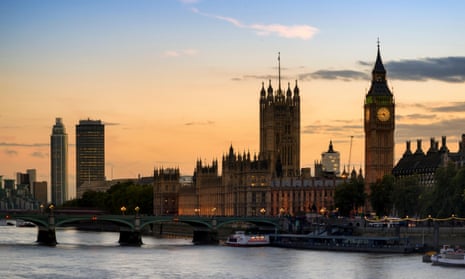So much rubbish has been spoken by so many men about sexual harassment that it’s hard to nominate a winner. But a strong contender in a crowded field is surely Rick Perry, the US energy secretary who, when running for president, famously forgot which government department he wanted to close (it was, naturally, the department of energy).
Perry’s contribution to the debate now raging on both sides of the Atlantic – kickstarted by the revelations about Harvey Weinstein and which has now taken down several media bigwigs, along with Kevin Spacey and Michael Fallon – was to suggest the answer to sexual assault might be … fossil fuels. Perry’s logic was that electricity in African villages can give “light that shines the righteousness, if you will, on those types of acts”. It seems a street lamp powered by a renewable source would lack a similar degree of virtue.
Perry’s remarks are unlikely to find much of an echo. Louder, and more dispiriting, has been the chorus of voices, not all of them male, whose first reaction to the revelations of abuse, humiliation and assault by powerful men has been to decide that there is a series of tough questions that need to be answered – by women.
With Weinstein it was: why didn’t these women speak out earlier? Why did Hillary Clinton accept donations from this monster? (A question that was scarcely put to Barack Obama, even though he took twice as much money from Weinstein.) What were these women doing in a man’s hotel room anyway?
In Britain, the Westminster accusations have prompted a set of questions that have also been put to women rather than men. Why didn’t you stand up for yourself? If you were so offended, why did you stay in contact with the guilty man? Are you really such a delicate soul that a fleeting hand on the knee can hurt you so badly?
The textbook illustration came in the treatment handed out to Kate Maltby, the Conservative writer who described an encounter with Damian Green. She was subsequently shredded across a double-page spread of the Daily Mail that branded her “One very pushy lady”.
It’s hard to think of another scandal where the finger has been pointed so swiftly at the victims rather than the perpetrators. That’s partly thanks to the prominence given to those women who would rather upbraid their sisters than support them: witness Edwina Currie asking Harriet Harman if women were “so weak, so useless” that they couldn’t tell a lecherous man to push off.
But it’s also been aided by the meagre contributions men have so far made to this conversation, many of them choosing to say nothing. It’s added to the sense that this is a women’s problem rather than one confronting us all – and one for which men, as the main offenders, have an obvious responsibility.
When men have spoken out, their input has too often collapsed into the self-pitying complaint that all is now confusion, that today’s cheerfully innocent man has no idea how to behave as he is forced to pick his way through a dizzying hall of mirrors constructed by feminism and political correctness.
There’s nothing wrong with admitting uncertainty – and I suspect most of us have been interrogating our own past or present conduct in the workplace, wondering if we’ve been getting it wrong. We all need to make that effort, and to make it in good faith. What’s grating, though, is when an apparent claim of disorientation is, in fact, a disguised complaint that women’s objections to harassment are stopping men having the office fun they used to regard as their right.
Because, in truth, this isn’t all that complicated. Hopefully the extreme cases – of rape, of coercion, of an explicit threat of consequences if sexual favours are withheld – are clear to most men already. As for the supposedly grey areas, Ruth Davidson helpfully distilled the key point. “It isn’t actually about sex,” she said. “It’s about power, it is always about power.” For if one person is in a position of authority over another, even the smallest gesture can acquire a new and different meaning. Men need only think of their own working relationships with other men to realise that they already understand this deeply. The merest glance from a boss towards one colleague rather than another can be read by the office Kremlinologists as a sign of preference and favour. I recall the editor who with the tiniest arch of his eyebrow – I do not exaggerate – could signal a change in policy that would percolate through the entire organisation.
In this context, it’s obvious that a touch of a woman’s knee from a man with power means something different than it would from a peer. We humans are capable of sophisticated communication by the subtlest of means. When a senior male politician makes such a move towards a young female journalist or sends a florid text message, it is hardly a stretch to read that as a signal of interest – and if it comes during, say, a conversation about careers, a promise of advancement if the implied offer is accepted. And of negative consequences if it is declined.
If that can be true of a fleeting touch, it can also be true of a compliment or a joke that, if served up by a friend might be fine, but if delivered by someone with more power can be unsettling. I suspect some men have held back from this conversation for fear that they either have or will get it wrong. No man can be entirely immune from that fear.
For my own part, I received a crash course in all this in Washington during the 1990s, where I spent five formative years. The city was shaken by a series of sexual harassment scandals that yielded two valuable lessons. One was that an atmosphere of casual sexism might constitute a “hostile working environment” even when it did not involve a specific word or gesture directed at a specific woman. Another was that “consent” loses much of its meaning when one person holds power over another.
I’d like to say I internalised those lessons through the pure nobility of abstract principle. Maybe that was part of it; but just as strong was the urge not to be the office jerk. The guy who would ambush female colleagues from behind, giving them an unwanted shoulder massage, was an embarrassment. No one wanted to be that guy.
If anything good might come from these last, bruising few weeks it is, perhaps, that those lessons are being taught anew. Because if one thing is screamingly obvious here, it’s that men need to say to women that, when it comes to sexual harassment, the problem is not you – it’s us.

